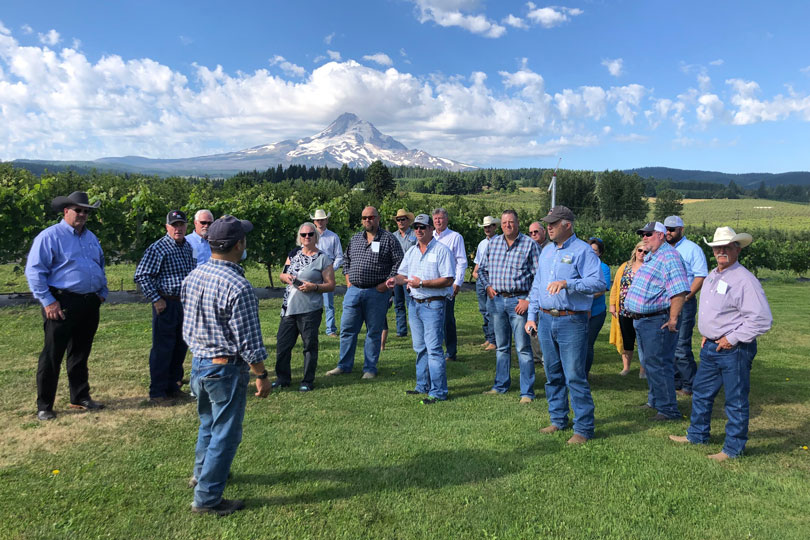By Jennifer Dorsett
Field Editor
Texas Farm Bureau’s (TFB) 2019-2020 AgLead-FarmLead class traveled to Oregon and Washington this month to learn more about agriculture in the Pacific Northwest.
The group of 20 Texas farmers and ranchers toured several orchards, two dams important to production agriculture, a dairy and the Washington Farm Bureau state office, along several other places.
“It’s been a really good trip,” Grayson County Farm Bureau (CFB) member Austin Miles said. “I think I speak for all of us when I say I’m very thankful to have the opportunity to see things I’d never have seen on my own.”
Farmers and ranchers in the Pacific Northwest face some familiar challenges. Water availability and tensions between urban and rural populations weren’t new to the Texans, but the scales were noticeably different.
“One of things that caught my attention the most is how they irrigate,” Bell CFB member John Evans said. “We think of Washington as this place that receives lots of rain, but the eastern half of the state only receives about six to eight inches of rainfall annually. It was pretty interesting to hear some of the issues and production challenges they face.”
The McNary and Grand Coulee dams are an integral part of the farm irrigation system east of the Cascade mountain range, in contrast to the groundwater sources most common in Texas.
Evans said Texas farmers in drier parts of the state likely have much less water available than the Pacific Northwest farmers relying on the dams.
“We have to be a little more conservative with our water,” he said. “The dams just have more capacity due to the replenishment from the mountains. Aquifers don’t quite work that way.”
Miles said despite the irrigation challenges, Washington and Oregon farmers make much with what they’re given.
“I’ve seen statistics and production figures on their fruit and vegetable and ornamental specialty crops in this area, but until you see it—how productive they can be with their limited access to irrigation—it’s just amazing how productive their soil seems to be,” he said.
Washington Farm Bureau representatives who visited with the group said the majority of the state’s population is disconnected from production agriculture, so farmers and ranchers in the Pacific Northwest face a significantly more vocal opposition. There are many efforts to ban or disrupt conventional farming or ranching practices.
“Texas has a rural history but we’re getting more and more urban. I suspect that in the future we’ll be seeing similar things happening to us,” Evans said.
Miles agreed the political climate is different than in the Lone Star State when it comes to agriculture.
“People just don’t understand the production system and inputs and that policy impacts how farmers produce a crop,” Miles said. “It’s outside of party line. It’s just more of an urban population. I have left with an even greater appreciation of our state. Even though we have our challenges in Texas, just like anyone else, we just don’t have that issue to the same degree.”
The Pacific Northwest trip took place July 21-26. It is the third of seven sessions AgLead-FarmLead participants will take during the two-year program.
Click here to learn more about AgLead-FarmLead opportunities.

